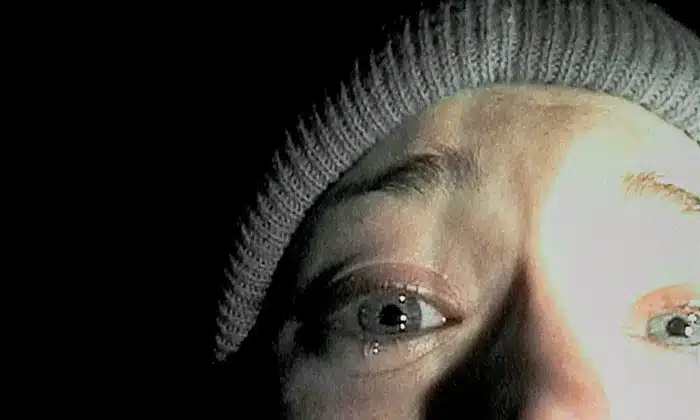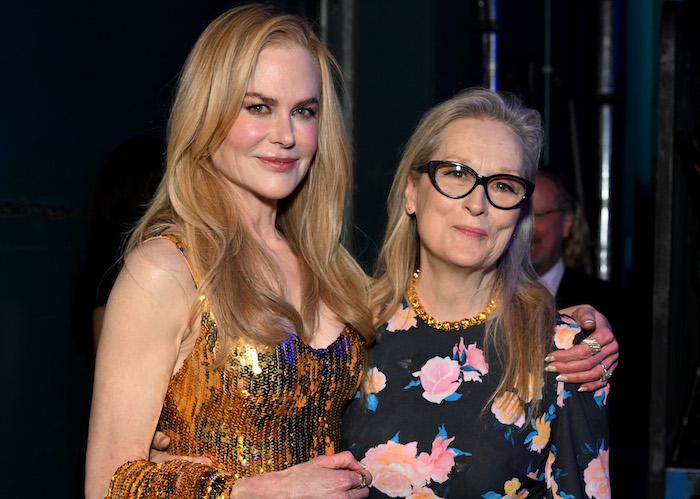

The Original 'Blair Witch Project' Cast Fights For Their Rights And Royalties
By Jen Maravegias | Film | April 24, 2024 |
By Jen Maravegias | Film | April 24, 2024 |

In the winter of 1997, the wild rumor that recent graduate Mike Williams had died during a camping trip briefly spread through the theater department at SUNY New Paltz. People were distraught. Mike was a well-loved legend in the department. Funny, smart, talented, and friendly. When he showed up on campus a few weeks later for an improv show we were all shocked in the best way possible. When we learned the rumor was based on the plot of a “little indie” movie he had been shooting some of us felt silly. But all of us were excited for Mike.
At the time, SUNY New Paltz had a few notable theater alumni like John and Aida Turturro and Joan Chen (Twin Peaks). And it felt like our theater professors knew everybody in New York’s theater and film scene. But this was different. Mike was one of us. And no one who took classes with him could deny how talented he was. We were all excited about this movie being released, whatever it was called. Something about a witch? In the woods?
By the time The Blair Witch Project hit theaters in 1999, I had graduated and moved to Chicago. A group of us got together and got the pants scared off of us watching the movie on opening weekend. When it was released, a lot of viewers complained about motion sickness from the shaky, hand-held camera work. But The Blair Witch Project grossed almost $250 million worldwide, an unheard-of record for indie films at the time. It was the launching point for the “found footage” horror genre. Twenty-five years after it was released, The Blair Witch Project is still celebrated at cons, lampooned in pop culture, and spawns sequels and reboots. Although often imitated its success has never been duplicated.
Created by Daniel Myrick and Eduardo Sánchez who met while they were film students. They created Haxan Films with three other people, which is the company that shot the original Blair Witch for $60,000 in about a week and starred then-unknowns Michael C. Williams, Joshua Leonard, and Heather Donahue (who now goes by the name Rei Hance.) They used their real names and played versions of themselves in the film, using dialogue the actors improvised.
Blair Witch premiered at Sundance and was quickly purchased for distribution by Artisan Entertainment for $1 million. The cast had a 1% stake in the film and they agreed to a buyout of their ownership rights for $300,000 each. A regrettable move on their part because it cut them out of all future royalties.*
*After publication I was contacted by Mr. Williams who asked me to correct the information regarding the sale of the film:
We had a deal with Haxan Films. 1% of any Haxan profits over 1,000,000 dollars. A page-and-a-half contract. We never sold anything. Haxan sold the film entirely to Artisan and we had no seat at the table. No residuals because we weren’t SAG. So we didn’t actually sell any of our shares. Haxan sold everything.
According to star Joshua Leonard, who is spearheading a campaign for the three actors to be paid retroactive royalties, when the movie was released, Artisan told the actors that the company was losing money on marketing expenses and suggested the cast may end up owing money even as the movie was breaking records in the box office.
Lionsgate (which bought Artisan Entertainment in 2003) recently announced a partnership with Blumhouse to reboot the franchise. The production has already released promotional material that capitalizes on Joshua Leonard’s image without his prior knowledge or permission. The project’s announcement and the use of his likeness spurred Leonard into action. The cast reunited at Panic Fest earlier this year and are now working together to speak out and spread the word on social media about how unfairly they were paid years ago, and what they’re requesting from Lionsgate moving forward.
They’re asking for retro and future residual payments equivalent to the sum they would have been allotted through SAG-AFTRA if they’d had proper representation when the original film was made. They’re also requesting consultation on any future Blair Witch projects for which their names and/or likenesses may be used.
Finally, they’re asking that Lionsgate establishes an annual “Blair Witch Grant” of $60,000 for unknown/aspiring genre filmmakers to help offset the cost of making their first feature films.
They have an uphill battle ahead of them. But, this cast is no stranger to legal fights. Per Rei Hance, the movie studio tried to put a copyright claim on the characters’ names after the original film was released. The trio had to take them to federal court to win back the rights to their own names.
Another lawsuit was tied to the 2000 sequel Book Of Shadows: Blair Witch 2, which used clips of the characters from the original movie in promotional materials and in the movie itself. None of them saw any money from that movie at all.
The directors and producers of the original film support the request for retro and future pay and have released a separate statement supporting the campaign that Josh Leonard has launched. It says, in part,
…we must highlight the significant contributions of the original cast…As the literal faces of what has become a franchise, their likeness, voices, and real names are inseparably tied to The Blair Witch Project. Their unique contributions not only defined the film’s authenticity but continue to resonate with audiences around the world…
In The New York Times article about these efforts, a New York City-based entertainment lawyer is quoted as saying they’ll have very little chance of winning this fight if it goes to court. He sees it as a cautionary tale about making sure you have proper representation giving you solid advice.
But 1999 was a very different time. Getting to a place in your career where you earned “representation” was hard. Becoming known was difficult, forget about being famous. Young actors were happy to have a guest spot on Law & Order if they could get them. And from there maybe someone noticed you. From there you might get a Rep and a team to guide your decisions. There were no social media influencers making brands of themselves and gaining millions of followers by creating viral videos. Before the age of YouTube channels and TikTok making a name for yourself took a lot more time, effort, and talent.
In a recent interview with People, Michael J. Fox said that before this era of fast fame, you had to have talent to get anywhere in Hollywood. It was always what came first, before representation and notoriety. The Blair Witch Project was a showcase of craft, determination, and talent that should have been a lucrative stepping stone to a brighter future for everyone involved. But that didn’t materialize for the cast who put everything on the line to make the movie. If Lionsgate ($3.85 billion in revenue for 2023) and Blumhouse ($5 billion in revenue) can’t afford to cut Leonard, Williams, and Hance in on their fair share of profits they might want to remember how poorly all of the previous sequels, reboots and merchandising (an escape room, really?) have done without their involvement and make the right, moral, decision here. Even if their request wouldn’t hold up in court.
← Lisa Vanderpump Calls Andy Cohen 'Inappropriately Naughty' | Billie Eilish Thinks She Should Have 'A Ph.D In Masturbation' →
More Like This
Meryl Streep Says Nicole Kidman Skinny-Dipped Every Morning While Filming 'Big Little Lies'
Analytics Killed A New Show From David Cross And Bob Odenkirk
Brandi Glanville Says She’s Been ‘Hung Out to Dry’ by Bravo
The Entire First Season of 'Last Week Tonight' Is Now Streaming For Free On YouTube
Anne Hathaway Used to Be a ‘Chronically Stressed Young Woman’

Meryl Streep Says Nicole Kidman Skinny-Dipped Every Morning While Filming 'Big Little Lies'
Analytics Killed A New Show From David Cross And Bob Odenkirk
Brandi Glanville Says She’s Been ‘Hung Out to Dry’ by Bravo
The Entire First Season of 'Last Week Tonight' Is Now Streaming For Free On YouTube
Anne Hathaway Used to Be a ‘Chronically Stressed Young Woman’
Meghan McCain Basically Called Kristi Noem a ‘Serial Killer’
More Like This
Meryl Streep Says Nicole Kidman Skinny-Dipped Every Morning While Filming 'Big Little Lies'
Analytics Killed A New Show From David Cross And Bob Odenkirk
Brandi Glanville Says She’s Been ‘Hung Out to Dry’ by Bravo
The Entire First Season of 'Last Week Tonight' Is Now Streaming For Free On YouTube
Anne Hathaway Used to Be a ‘Chronically Stressed Young Woman’
Reviews